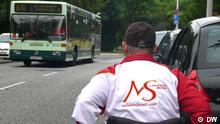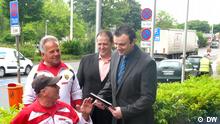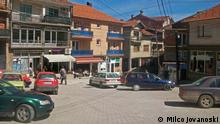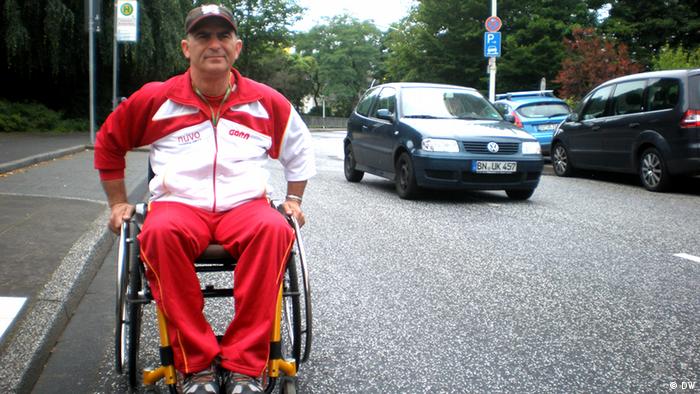Mile Stojkoski has set himself a big challenge: The 47-year-old is traveling to the London Olympics from his home in Macedonia. He's covering the 5,700 kilometers in his wheelchair.
Mile Stojkoski wheels himself along the edge of the road, dressed in an eyecatching red-and-white tracksuit, with thick silicon gloves to protect his hands. The cars and buses are forced to swerve round him as he travels along.
Mile, who is paralyzed from the waist down, is currently in Germany - over half-way through his herculean journey.
Progress, especially on the uphill stretches, can be painfully slow. But, says Mile, it's not a race - he just wants to make it to London in time for the start of the Olympics on July 27th. He left Macedonia in mid-March and has already notched up ten countries on his journey: Serbia, Hungary, Slovakia, Austria, Croatia, Slovenia, Italy, Switzerland and now Germany. He has four more countries ahead of him before he reaches the UK.
Progress, especially on the uphill stretches, can be painfully slow. But, says Mile, it's not a race - he just wants to make it to London in time for the start of the Olympics on July 27th. He left Macedonia in mid-March and has already notched up ten countries on his journey: Serbia, Hungary, Slovakia, Austria, Croatia, Slovenia, Italy, Switzerland and now Germany. He has four more countries ahead of him before he reaches the UK.
Grabbing attention
Mile wants to raise awareness about disability by provoking a response, any response, from the people he meets along the way.
Mile wants to raise awareness about disability by provoking a response, any response, from the people he meets along the way.

Cars and buses have to swerve around Mile as he wheels along
"The reactions are always positive, and people are either stunned, shocked or very glad to see something like this," he told DW, speaking through an interpreter. "My idea is to come out on the streets to make disability visible, to make it disappear. Even if it's dangerous, I keep on doing it."
It is a pretty dangerous undertaking. Mile is accompanied by a team of two in a support car. But he's been stopped by the police several times - most recently last weekend, when he was pulled over by an off-duty German police officer. She eventually let him go after giving him a warning about the hairpin bends and heavy traffic in the area.
It is a pretty dangerous undertaking. Mile is accompanied by a team of two in a support car. But he's been stopped by the police several times - most recently last weekend, when he was pulled over by an off-duty German police officer. She eventually let him go after giving him a warning about the hairpin bends and heavy traffic in the area.
Shoestring budget
Mile has the backing of the Macedonian government - but funding is a problem. He relies on donations from individuals or companies. Often, he and his team have to pitch up a tent overnight to save money. It's a grueling schedule.
Mile has the backing of the Macedonian government - but funding is a problem. He relies on donations from individuals or companies. Often, he and his team have to pitch up a tent overnight to save money. It's a grueling schedule.
"A typical day for us is getting up at 6am, getting ready by 8," Mile explains. And we start pushing 50 to 70 kilometers every day, and I only stop when I have to meet organizations or do a press conference."
Meeting those who work with the disabled is an integral part of his trip. Whilst in Bonn, he visits the headquarters of the International Paralympic Committee (IPC) - which is publishing a blog of his journey.
"I have a lot of admiration for somebody that is willing to take the journey and going from the Balkans to London to celebrate the Paralympic movement, but also to send the message back home that there are things that need to be changed," said Xavi Gonzalez, IPC chief executive.
Raising awareness
Meeting those who work with the disabled is an integral part of his trip. Whilst in Bonn, he visits the headquarters of the International Paralympic Committee (IPC) - which is publishing a blog of his journey.
"I have a lot of admiration for somebody that is willing to take the journey and going from the Balkans to London to celebrate the Paralympic movement, but also to send the message back home that there are things that need to be changed," said Xavi Gonzalez, IPC chief executive.
Raising awareness
Disabled people in Macedonia and other parts of the Balkans are rarely high on the political agenda. They lack access to amenities like rehabilitation centers or specialized sporting facilities. Many are shut away at home, or in institutions.

In Bonn, Mile and his team visit the headquarters of the IPC
Mile says the differences between eastern and western Europe are "black and white" when it comes to disability. But the thing that frustrates him is that disabled people in the west don't always make use of the opportunities they have - and he wants to provoke them into action.
"I'm trying to motivate them, but it's honestly frustrating," he said.
Mile was left paralyzed from the waist down after a motorbike accident in 1996. His says sport was the key to his recovery - both physically and mentally. His passion for ultra-marathons began when he wheeled himself to the Olympics in Athens in 2004. He attempted to repeat the feat by travelling to the games in Beijing four years later - but he only got as far as Syria because he didn't have the required visa.
"I'm trying to motivate them, but it's honestly frustrating," he said.
Mile was left paralyzed from the waist down after a motorbike accident in 1996. His says sport was the key to his recovery - both physically and mentally. His passion for ultra-marathons began when he wheeled himself to the Olympics in Athens in 2004. He attempted to repeat the feat by travelling to the games in Beijing four years later - but he only got as far as Syria because he didn't have the required visa.
Olympic spirit

Disabled people in Macedonia have limited access to facilities
"I believe that the Olympic spirit is the highest possible expression of internal strength, that's why I wish to promote the Olympic and Paralympic Games," Mile said.
So why doesn't Mile participate in the Paralympics himself? He's clearly got the stamina for a wheelchair marathon or two. He says he's tried many sports over the years, but this is what suits him best:
"My great ambition, yes it was to participate in the Paralympic Games, but I found that doing ultra-marathons was far more interesting to me and suited my character of will and persistence."
So why doesn't Mile participate in the Paralympics himself? He's clearly got the stamina for a wheelchair marathon or two. He says he's tried many sports over the years, but this is what suits him best:
"My great ambition, yes it was to participate in the Paralympic Games, but I found that doing ultra-marathons was far more interesting to me and suited my character of will and persistence."
That sense of persistence will now take him through to the Netherlands, Belgium, Luxembourg and France on the final leg of his journey, before he hops across the channel to the UK in time for the opening ceremony of the Olympic Games in London.
Author: Joanna Impey
Editor: Helen Seeney DW DE
Editor: Helen Seeney DW DE


No comments:
Post a Comment